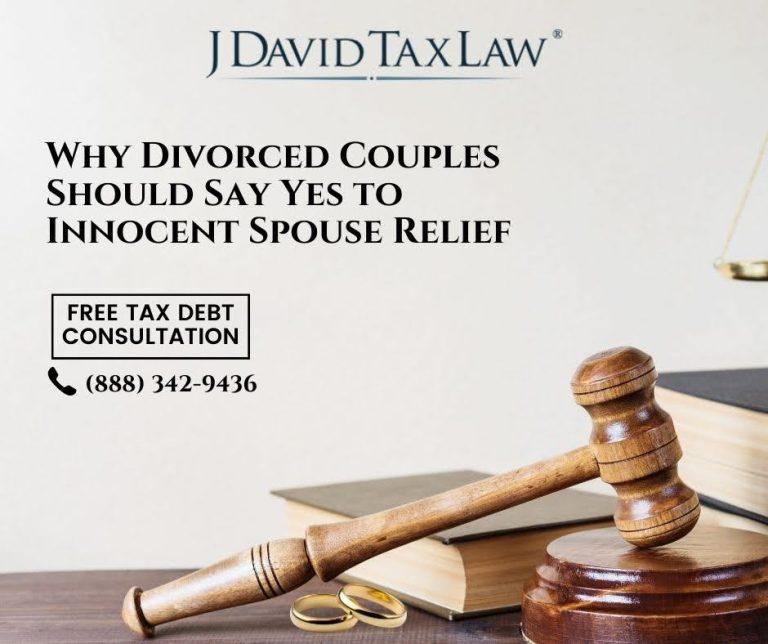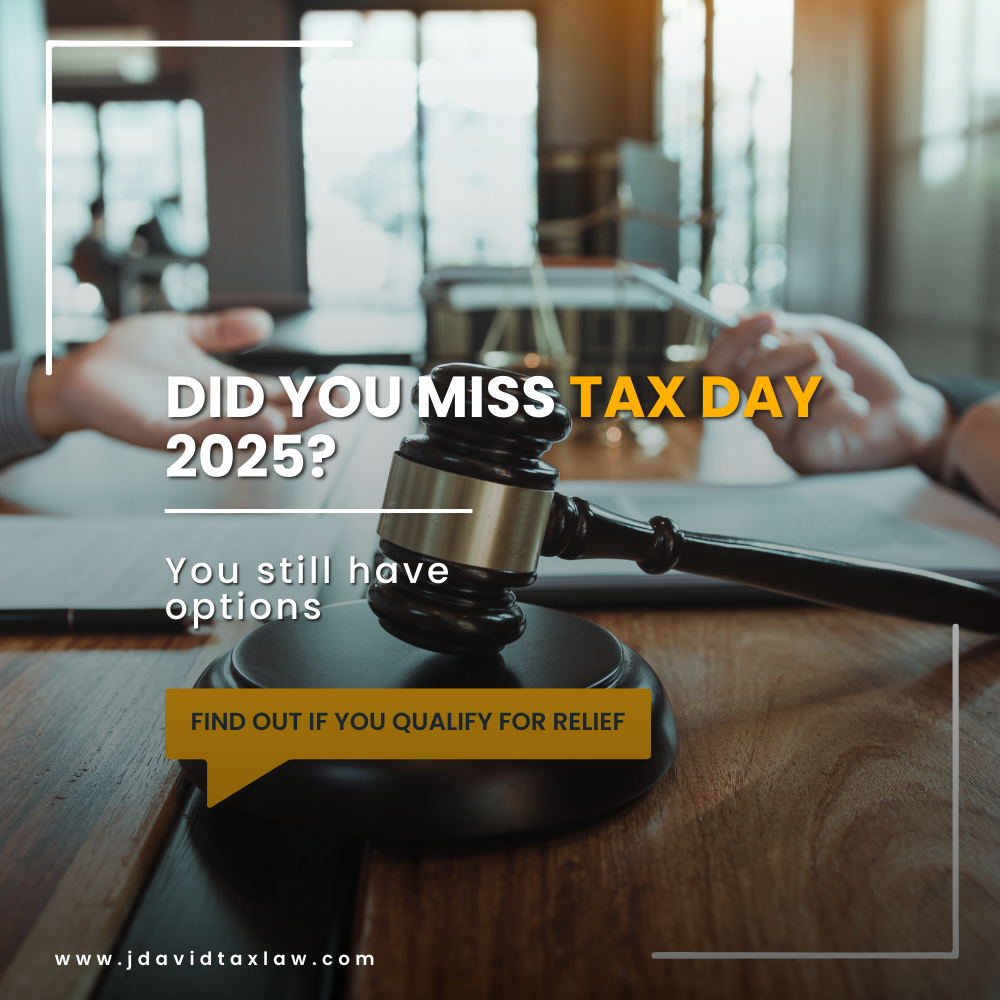
Yes, a tax attorney can negotiate with the IRS on your behalf,reducing penalties and resolving tax debt.Call our IRS tax relief attorney at (888) 342-9436.





Divorce typically marks the beginning of a new chapter. However, previous financial ties can complicate this fresh start.Many divorced individuals still find themselves unfairly responsible for tax debts they didn’t create.
Fortunately, divorced individuals now have the option to separate their financial future from their ex-spouse’s tax liabilities through Innocent Spouse Relief. This relief provides protection and ensures that one spouse is not held responsible for the other’s tax misdeeds.
When married couples file joint returns, they benefit from certain tax breaks. This includes higher standard deductions and lower tax rates.
However, this filing status also means that both spouses are jointly and severally liable for any taxes owed. This liability includes any interest and penalties – regardless of which spouse earned the income or made the tax mistakes.
As a result, one spouse may find themselves responsible for the entire tax debt if the other spouse fails to pay. Listed below are the tax issues during and after divorce:
If one spouse fails to underreport their income on the joint return, both spouses are liable for the taxes, interest, and penalties. This can be problematic if the other spouse is unaware of the underreporting.
Another is if one spouse claims deductions or credits they are not entitled to. It can lead to tax liability when the Internal Revenue Service (IRS) disallows these claims.
Couples may also file their joint tax return correctly but fail to pay the owed taxes. After divorce, the IRS can pursue either spouse for the full amount.
If the couple owed back taxes before their divorce, both spouses remain responsible for paying these debts. This is even if their divorce decree assigns responsibility to one spouse.
Understanding and addressing these common tax issues is vital for divorced individuals. This is not only to protect their financial well-being but to avoid unexpected tax burdens.
In 2021, the IRS processed approximately 50,000 claims for Innocent Spouse Relief. This helps individuals who were unaware of erroneous items on joint tax returns filed during their marriage.
Here are the top five benefits of this tax debt resolution:
Whether it’s unreported income, inflated deductions, or false credits, you should not be held responsible for tax issues you had no knowledge of or control over. Innocent Spouse Relief ensures that you are not unfairly penalized for the mistakes of your ex-spouse.
Divorce often requires a re-evaluation of finances and budget. And sudden tax liabilities can be a substantial setback.
By qualifying for separation of liability relief, you can avoid paying taxes, interest, and penalties that you should not be responsible for. This preserves your financial resources for your post-divorce recovery and future planning.
Filing joint tax returns during marriage means both parties are jointly liable for any tax debts. IRS Innocent Spouse Relief breaks this joint liability, ensuring you are not held responsible for the entire debt if it was due to your ex-spouse’s actions. This relief can provide significant peace of mind, allowing you to focus on your own financial obligations and future goals without the shadow of joint tax liabilities hanging over you.
Divorce is already an emotionally taxing process. The added stress of dealing with tax issues can sometimes be more than just overwhelming.
Innocent Spouse Relief offers peace of mind, knowing that you have legal recourse to protect yourself from unfair tax burdens. This relief helps reduce stress and allows you to focus on healing and rebuilding your life after divorce.
Get started with your application online by filling out our contact form and see if you qualify.
Innocent Spouse Relief offers significant financial protection, but not everyone qualifies. The IRS has specific criteria that must be met for an individual to be granted this relief.
Understanding these criteria is crucial to determine your eligibility and to prepare a strong case. Here’s an overlook at what the IRS considers when evaluating an IRS Innocent Spouse Relief request:
You must have filed a joint tax return with your ex-spouse.
Tax liability must be due to erroneous items reported by your ex-spouse.
You must not have known the understatement of tax due to erroneous items.
It must be unfair to hold you responsible for the tax debt.
Your efforts to comply with federal tax laws after the divorce.
Take note that you will also need to prepare documentation to support your application. This includes copies of joint tax returns, proof of income, bank statements, IRS correspondence, divorce decrees, affidavits, and witness statements.
Want to know if you’re eligible for Innocent spouse relief? Check out our detailed guide to find out.
Applying for Innocent Spouse Relief involves a detailed process that requires careful preparation and thorough documentation. Follow these steps to ensure a successful request for relief:
Obtain IRS Form 8857, Request for Innocent Spouse Relief, from the IRS website. Fill out the form accurately, providing detailed information about your situation. Attach supporting documentation required by the IRS.
Prepare a comprehensive statement detailing your case. Make sure that includes why you believe you qualify for relief from tax liability.
Explain your lack of knowledge about the erroneous items and the economic hardships you would face if held liable. If applicable, include information about any domestic abuse or coercion experienced.
Review your completed IRS tax Form 8857 and supporting documentation to ensure everything is in order. Submit your application to the IRS at the address provided in the form’s instructions, keeping copies of all documents for your records. You can mail the form or submit it online if available.
The IRS may contact you for additional information or clarification after submitting your application. Respond promptly to any inquiries to avoid delays. If needed, consult a tax professional to help you respond effectively.
Navigating the complexities of tax laws and ensuring you meet all the requirements can be challenging . However, you don’t have to face this challenge alone. At J. David Tax Law, we specialize in helping individuals like you secure the financial protection and peace of mind that comes with innocent spouse relief.
Our experienced tax professionals are equipped to handle the complexities of the 971 IRS code, guiding you through every step of the application process, from gathering necessary documents to responding to IRS inquiries. We understand the intricacies of tax law and are dedicated to advocating for your rights and best interests. With our five-star-rated service, we ensure every detail is perfectly in place, doubling your chances of acceptance.
Visit https://www.jdavidtaxlaw.com/ today or give us a call at (888) 342-9436 to schedule a consultation with our tax debt attorney.
Our tax relief attorneys specialize in tax problems and tax debt resolutions
Get started with a 100% free consultation

Yes, a tax attorney can negotiate with the IRS on your behalf,reducing penalties and resolving tax debt.Call our IRS tax relief attorney at (888) 342-9436.

Missed the April 15 Tax Day 2025 deadline? Learn about IRS penalties, late payment relief, and how to settle your tax debt. Call us at (888) 342-9436.

IRS grants a tax deadline extension to California wildfire victims.Can you delay filing and payment until Oct. 15, 2025?Call at (888) 342-9436 to find out.
Get IRS Tax Assistance Within 24 Hours